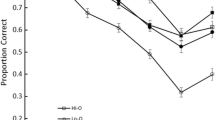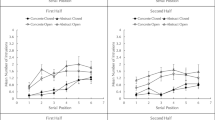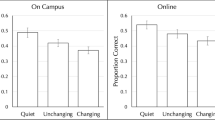Abstract
Subjects were exposed to 16 words under serial learning instructions and then received a serial recall test. Following this initial test, subjects (a) attempted recognition, (b) were prompted with extralist associative stimuli, or (c) again attempted serial recall. Subjects in the latter group then attempted recognition or were prompted for recall. Analyses of recall probabilities conditional on prior failure to recall showed that (a) subjects were more likely to recall prior failures of recall on a second serial test than on a second recognition test, and (b) recognition yielded more recalls of prior failures than did prompting. Secondary analyses showed that neither response criterion shifts, item selection artifacts, nor extra recall time accounted for the superiority of the second serial test. The results are interpreted to be inconsistent with a critical assumption underlying encoding specificity theory, and to be consistent with a recent stimulus-sampling version of generation-recognition theory.
Similar content being viewed by others
References
BILODEAU, E. A., & HOWELL, D. C. 1965. Free association norms. (Catalog No. D210.2: F87) Washington, D. C: U. S. Government Printing Office.
EAGLE, M., WOLITZKY, D. L., & KLEIN, G. S., 1966. Imagery: Effect of a concealed figure in a stimulus. Science, 151, 837–839.
EBENHOLTZ, S. M. 1963. Serial learning: Position learning and sequential associations. Journal of Experimental Psychology, 66, 353–362.
ERDELYI, M. H. 1970. Recovery of unavailable perceptual input. Cognitive Psychology, 1, 99–113.
ERDELYI, M. H. 1972. The role of fantasy in the Poetzl (emergence) phenomenon. Journal of Personality and Social Psychology, 24, 186–190.
ERDELYI, M. H., & BECKER, J. 1974. Hypermnesia for pictures: Incremental memory for pictures but not words in multiple recall trials. Cognitive Psychology, 6, 159–171.
GIDDAN, N. S. 1967. Recovery through images of briefly flashed stimuli. Journal of Personality, 35, 1–19.
HABER, R. N., & ERDELYI, M. H. 1967. Emergence and recovery of initially unavailable perceptual material. Journal of Verbal Learning and Verbal Behavior, 6, 618–628.
PELLEGRINO, J. W. & SALZBERG, P. M. 1975a Encoding specificity in cued recall and context recognition. Journal of Experimental Psychology: Human Learning and Memory, 1, 261–270.
PELLEGRINO, J. W., & SALZBERG, P. M. 1975b. Encoding specificity in associative processing tasks. Journal of Experimental Psychology: Human Learning and Memory, 1, 538–548.
RABINOWITZ, J. C., MANDLER, G., & PATTERSON, K. E. 1977. Determinants of recognition and recall: Accessibility and generation. Journal of Experimental Psychology: General, 106, 302–329.
RUNQUIST, W. N. 1973. Conditional recall and bias in memory experiments. American Journal of Psychology, 86, 351–359.
TULVING, E. 1972. Episodic and semantic memory. E. Tulving & W. Donaldson (Eds.), Organization of memory. New York: Academic Press.
TULVING, E. 1976. Ecphoric processes in recall and recognition. J. Brown (Ed.), Recall and recognition. London: Wiley.
TULVING, E., & THOMSON, D. M. 1973. Encoding specificity and retrieval processes in episodic memory. Psychological Review, 80, 352–373.
TULVING, E., & WATKINS, M.J. 1975. Structure of memory traces. Psychological Review, 82, 261–275.
WAGENAAR, W. A. 1969. Note on the construction of digram-balanced Latin squares. Psychological Bulletin, 72, 384–386.
WATKINS, M. J., & TULVING, E. 1975. Episodic memory: When recognition fails. Journal of Experimental Psychology: General, 104, 5–29.
WISEMAN, S., & TULVING, E. 1975. A test of confusion theory of encoding specificity. Journal of Verbal Learning and Verbal Behavior, 14, 370–381.
WISEMAN, S., & TULVING, E. 1976. Encoding specificity: Relation between recall superiority and recognition failure. Journal of Experimental Psychology: Human Learning and Memory, 2, 349–361.
YARMEY, A. D. 1976. Hypermnesia for pictures but not for concrete or abstract words. Bulletin of the Psychonomic Society, 8, 115–117.
YOUNG, R. K. 1962. Tests of three hypotheses about the effective stimulus in serial learning. Journal of Experimental Psychology, 63, 307–313.
Author information
Authors and Affiliations
Additional information
The research reported here was supported in part by grants to the University of Minnesota, Center for Research in Human Learning, from the National Science Foundation (GB-17590), the National Institute of Child Health and Human Development (HD-01136 and HD-00098), and the Graduate School of the University of Minnesota. Preparation of the paper was aided by a Faculty Development Grant from Kenyon College to the first author. We express our gratitude to Dennis Wipper for assistance in data reduction and analysis, and to an anonymous reviewer who read an earlier report of this research. Requests for reprints should be sent to the first author, Department of Psychology, Kenyon College, Gambier, Ohio 43022.
Rights and permissions
About this article
Cite this article
Hoppe, R.B., Dahl, P.R. Hypermnesia for Words in Serial Learning. Psychol Rec 28, 219–229 (1978). https://doi.org/10.1007/BF03394530
Published:
Issue Date:
DOI: https://doi.org/10.1007/BF03394530




